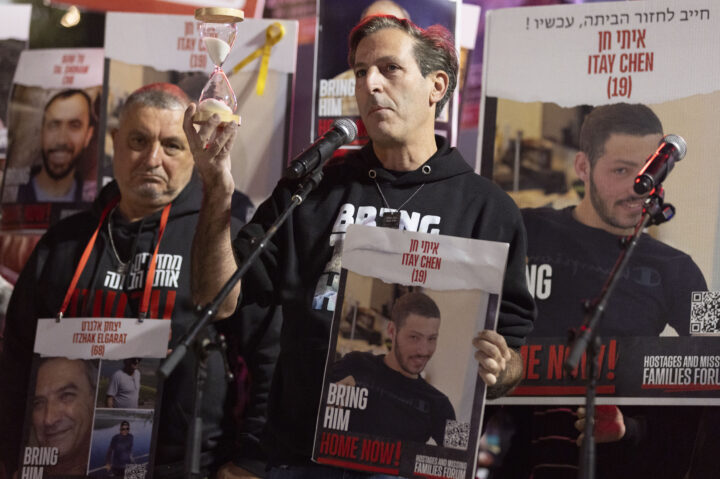With public attention on Lebanon, hostage families frustrated but see opportunity
'In practicality, it means we are abandoning the hostages to die,' said Udi Goren, cousin of Tal Haimi, who was kidnapped by Hamas on Oct. 7 and murdered soon after

Maja Hitij/Getty Images
Ruby Chen, father of 19-year-old hostage Itay Chen speaks at the press conference at hostage square on December 16, 2023 in Tel Aviv, Israel.
Relatives of hostages kidnapped by Hamas have expressed frustration at the shift in attention of the public and decision-makers in Israel and abroad toward the escalation between Israel and Hezbollah and away from the hostages, but some view cease-fire talks with Lebanon as an opportunity to secure their loved ones’ release.
Udi Goren, cousin of Tal Haimi, who was kidnapped by Hamas on Oct. 7 and murdered soon after, told Jewish Insider on Thursday that he is “very, very concerned” that the focus is shifting north when “we have no diplomatic achievements in Gaza.”
“We did not meet the goals of going to war in Gaza in the first place, to topple Hamas and bring home the hostages,” Goren continued. “Neither was achieved … and the attention of Israelis, the government, the media, the international community, all moved north.”
“In practicality, it means we are abandoning the hostages to die,” he added. “Six hostages were executed a month ago. How can it be that we are suddenly ignoring the situation?”
Of the 249 Israelis abducted by Hamas on Oct. 7, 101 remain in Gaza, with many presumed to be alive. Hamas has rejected all cease-fire proposals in recent months, and negotiations have stalled in recent weeks.
Meanwhile, Hezbollah escalated its attacks on Israel, which remotely detonated pagers belonging to members of the Iran-backed terrorist group last week.
Goren acknowledged that “Israel has tens of thousands of evacuees from the north who don’t have where to return to.”
But he said that “it’s not a force of nature, an act of God” that has made the focus to Hezbollah after a year of the Lebanese terrorists shooting rockets and missiles at Israel; rather, it was a decision by the government, he argued.
Hostage families are “fighting now more than ever. We are constantly thinking about this intensively,” Goren said. “We will not give up or abandon this struggle. It was and remains the most important issue in Israel by leaps and bounds above anything else. There are 101 people, at least half still alive, and they are in immediate mortal danger. They are being tortured and starved.”
The Israeli public is still with the hostage families and tens of thousands from across the political spectrum attend their weekly demonstrations, Goren said.
“I hear people all the time who I don’t know, who are not related to hostages, saying they can’t sleep at night and can’t stop thinking about them,” which Goren said is because “Israel was established to be the safe home of the Jewish people … And if Israelis can be kidnapped and murdered in their homes without any response … if we don’t bring [the hostages] home, people feel that the Jews don’t have a home in the world.”
Gil Dickmann, whose cousin Carmel Gat was murdered in captivity by Hamas and whose sister-in-law Yarden Gat was released in the hostage deal last year, said that the international community’s efforts to broker a cease-fire between Israel and Hezbollah could help the hostages.
“The situation in the north is very clear,” Dickmann said in a briefing to foreign press on Thursday. “We have an opportunity to get a deal that will not only bring peace and security to the people of Israel who live in the north, but will also end this horrible tragedy in the south, get the hostages out, and then maybe we will be able to build our lives again.”
“What I know, as a family member, is that if you sign a deal, you get people home, secure and alive, just like what happened with Yarden. When you don’t, you miss the opportunity, and you get hostages dead … It’s too late for Carmel, but for the 101 hostages, most of whom are still alive, it’s not too late,” Dickmann said.
Malachi Shem Tov, father of hostage Omer Shem Tov, told Ynet on Wednesday that “this is the worst period in the entire year” since his son’s abduction, because “there is nothing, not even a hint, no negotiations, not even talks. Just nothing.”
“The campaign in the north puts the matter of the hostages aside,” he added. “The fears of the hostage families have come true.”
Shem Tov expressed hope that pressure on Hezbollah could lead Hamas to feel more isolated and come to the negotiating table, but said “I think we learned in the last year that [Hamas leader Yahya] Sinwar apparently acts how he wants to act and doesn’t care about anyone around him. I don’t see that up until now any pressure on him influenced him.”
The relatives of U.S. citizens held hostage by Hamas expressed skepticism about the need for a war with Hezbollah, in an interview with Jake Tapper on CNN last week.
“How does this help us strategically? Not only Israel, but the U.S. strategic interest to de-escalate,” Ruby Chen, father of Itay Chen, said.
Ronen Neutra, father of Omer Neutra, said that “the key to unlock the situation is to get a deal for an exchange of prisoners and end the war … A full-blown war is a risk for Israel right now.”
Adi Alexander, father of Edan Alexander, dismissed the exploding beepers operation as “Mission: Impossible action,” adding: “This violence needs to stop.”

























































